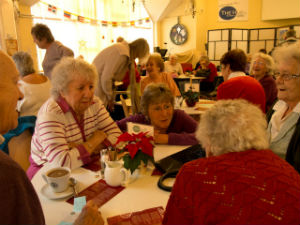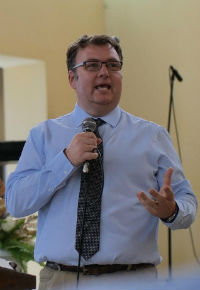Pioneering: How do I join in?
Pioneering is not just the domain of a few working on the fringe of church, it’s something Baptists have always done, and continue to do so, writes Graham Doel. Here are two very different examples of Baptist Christians in pioneering situations
Community collaboration in West Sussex

Baptists have always had a pioneering spirit. The call of the Kingdom of God has invigorated and enthused us down the ages. It has taken us to some unlikely places – and still does.
When you enter the leafy roads meandering through the South Downs towards Upper Beeding, your imagination conjures up drinking Pimms on the lawn while watching cricket. You wouldn't expect the unassuming Baptist Chapel, hidden on a one-way street, to be a hotbed of Baptist pioneering. The members don’t think about it that way either. They are simply living out their calling as Christians in their community, but they join the generations of Baptists getting on with living out the Kingdom of God in their setting.
Upper Beeding Baptist Church has a long history of sharing good news and taking evangelism seriously, and recently it has begun to focus on being a church in the community: not simply serving the community, but joining the community at the heart of its life.
As a tangible expression of this change the church has started to use its building as a community café. When a church does this it is often seen in two ways: as an act of service to the community, meeting a need where one exists, and as a stepping stone for people towards church services. In Upper Beeding the café is seen as a place to collaborate with the community, creating café and community together so that, in some way, the Kingdom of God may be seen.

This aspect of pioneering is not complex of difficult, but it does involve a change of mind-set. Little things like involving people from beyond the church in setting up chairs and tables help. By allowing that, you are not doing the café for them but being with them in the creation of community space.
“What we are trying to be is a federation of missionary Christians thinking about how we act as missionaries in every part of our lives,” says minister Peter Butchers (pictured) as he explains the church's values.
“This is quite different from being a church that has a mission to invite people along to this event or that. Christ calls all of us to a new place, those who go to church and call themselves Christians, and those who don’t”.
God calls his church to join in with what he is doing, in the places he is doing them
In the zone in Manchester

When you walk with Gary Serra di Migni through the streets of Manchester you can’t help feeling that, in comparison to Upper Beeding, you are in a different world. The tightly packed houses are round every corner you turn. This is an area of vibrant multicultural life. The streets buzz with activity and the gentle hum of city life can be heard everywhere.
Facilitated by the church planting agency Urban Expression and the North Western Baptist Association, the team of which Gary is part deliberately took 18 months to listen to the community and to hear where God was already at work. As a result the team – called Urban Expression, Victoria Park - has begun to see itself as operating in three distinct zones: “God at work”, “God in pursuit of justice”, and “God in bereavement”. The team do not receive stipends but see themselves as “omni-vocational”, working in situations where they can see the Kingdom of God at work.
Gary works for ASDA. His choice of occupation was deliberate, thinking about what job he could do that would bring him into contact with many different people from a variety of walks of life. As he has stacked shelves alongside people he has made many new friends. He also works as a funeral consultant, conducting services for people who have no connection with churches.
This kingdom orientated work of transforming lives has been expanded because the team have listened to God, found out where he is working and followed him there

One of their team, Jayne Irlam (pictured with Gary), calls this integrated view of work, faith and church as “stepping into the slip stream of the Holy Spirit” .
During that period of looking and listening to the community the team made an unlikely connection between Christian-run drug and alcohol rehabilitation centre and the local police force. Jayne was working with them as an on-call nurse. As part of her care for patients in custody who showed signs of addiction, she began to share about the availability of Christian rehabilitation services and to help them make an informed choice. Her actions attracted the attention of the senior officers who invited her to a meeting.
Instead of being reprimanded for sharing about Christian-run services in the workplace, the effects of what Jayne was achieving were examined. As a result the approach that Jayne had been using was written into a policy called “forensic referral” and trialled throughout the district. It has been measured as such a success that seven other police authorities are now trialling the referral policy.
This kingdom-orientated work of transforming lives has been expanded because the team has listened to God, found out where he is working and followed him there.
So what is pioneering?
Pioneering work can be achieved whatever the circumstances Christians find themselves in. To be a pioneer is not necessarily about an Abrahamic-like call to leave everything and go to somewhere new. It can be about looking at the community you find yourself in and asking the question “Where is God already at work and how is he calling me to join in?”
That question has been asked by Christians down the ages. It is a question that is planted in the hearts of Christians by the Holy Spirit and it motivates them to action. When you talk to a theologian about this, they will call it part of the “Missio Dei”, which literally means the “mission of God”, or the “sending of God”. It is tempting to see pioneering mission as an activity for the Church, but the concept of Missio Dei sees mission as an attribute and an activity of God. God calls his Church to join in with the things he is doing, in the places he is doing them. There is an echo of Luke 10 where Jesus sends out the 72. He sends them out into communities encouraging them to find the person who will accept them, feed them, and receive their kingdom work.
These two stories demonstrate this principle in action. For the church in Upper Beeding it has meant the creation of a new space for enabling relationship and collaborating in community. In the North West it has involved responding to a need. Both stories reveal how God is using his people where they are.
And both these stories beg a question: “What is God doing near you, and how can you join in?”
Graham Doel is the UK Field Leader at BMS World Mission
Baptist Times, 02/09/2014